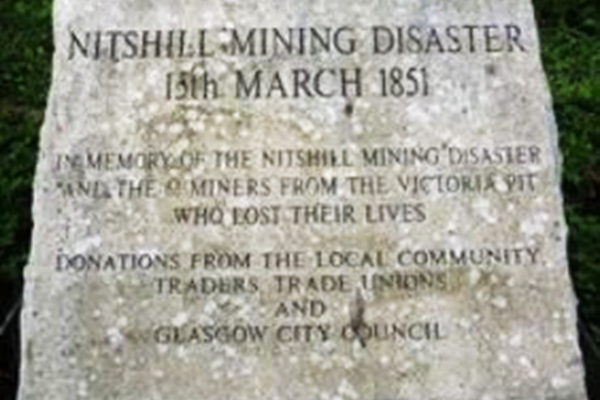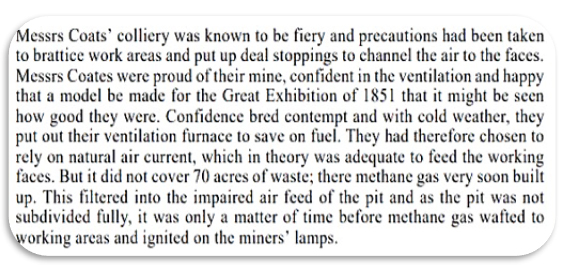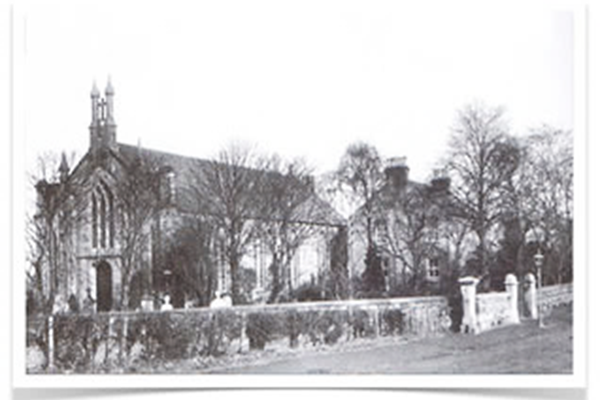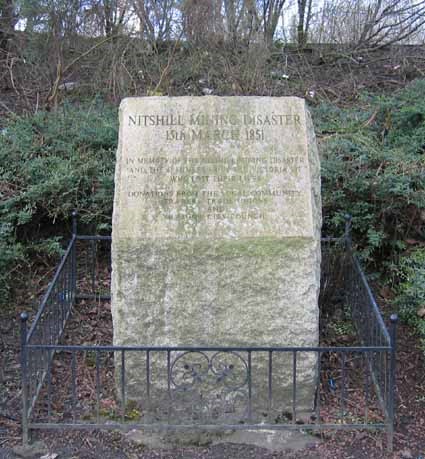Coal Mining & the Victoria Pit Disaster
Inquiries and Memorials

Inspector of Mines Report
Nitshill explosion in Scotland - 61 killed
This colliery had an abundant downcast and up cast shaft, with a tube fitted for a furnace; but so well satisfied was the manager with the ventilation that the furnace had been discontinued for some months. Many of the principal stoppings were of brick, and many of slit deal, to carry the air round the extremities of the workings; but there were no sheath stoppings in the waste. The accident was attributed to the damage of one of these stoppings, whilst the want of internal stoppings allowed the air to pass straight to the up cast shaft; and as the men were permitted to begin work without the examination of an overman, the gas discharged from the waste fired upon their naked lights."
Source: https://www.nmrs.org.uk/assets/pdf/BM41/BM41-76-98-renfrewshire.pdf :


Many of the victims were buried in a mass grave in the yard at the old St John's Church on Darnley Road, and although they were later exhumed to other cemeteries, some may still reside at St John's in an unmarked grave.
Among the victims were two pit ponies whose Stable had been blown up and whose bodies had been carried by the explosion a distance of fifty yards along on of the underground roads.'
Round the scorched entrance to the pit were scenes of harrowing distress. The bereaved women and children had hoped against hope that their menfolk would be brought out alive. But during the three black days of 22nd, 23rd, and 24th March a succession of bearer parties and hearses carried the bodies to the churchyard of St Johns Church in the Darnley Road at Barrhead. The mangled corpses of fifty-three men and eight lads had to be laid out awaiting identification. Some of the poor widows had to identify not only their husbands but two of their sons… The Glasgow Herald drew attention to the plight of the men’s widows and families and expressed the earnest hope that the Public would not forget that these poor men had left widows and sixty-five orphaned children in a state of utter destitution. Very considerable sums were collected after The Lord Provost of Glasgow and the owners, Messrs Coats had put up substantial sums. This may have been some consolation but only those who have experienced such tragic losses can appreciate the magnitude of the horror of such a disaster.'
It will be observed from an advertisement in this day's paper that Messrs. Coats have generously headed a subscription for the widows and children of the sufferers with the sum of £500 ; and they have also taken the initiative to the extent of £100 in another subscription to reward the men who have been engaged in rescuing the survivors, and recovering the bodies. To these laudable objects the Earl of Glasgow has contributed respectively £300 and £50. We also observe with much satisfaction from an advertisement in this day's paper that a benefit is to be given to-night in the Princes' Theatre, for the families of the sufferers.'
Source: Glasgow Herald, 24th March 1851.
It will be observed from an advertisement in this day's paper that Messrs. Coats have generously headed a subscription for the widows and children of the sufferers with the sum of £500 ; and they have also taken the initiative to the extent of £100 in another subscription to reward the men who have been engaged in rescuing the survivors, and recovering the bodies. To these laudable objects the Earl of Glasgow has contributed respectively £300 and £50. We also observe with much satisfaction from an advertisement in this day's paper that a benefit is to be given to-night in the Princes' Theatre, for the families of the sufferers..
Source: Glasgow Herald, 24th March 1851.
The widows and families of the unfortunate sufferers by the late calamitous Accident at the Victoria Coal Pit, Nitshill, having been left in a state of great destitution, it has been resolved to raise Subscriptions for their relief and also for rewarding the exertions of those intrepid individuals who have, with so much risk and danger to themselves aided in rescuing the survivors, and in recovering the bodies of those who have been killed.
Subscription Lists will be found at the Coffee Room, Paisley the Royal Exchange, Glasgow, and at the Offices of the several Banks in Glasgow and Paisley, and the amount of Subscriptions will be received by John Scott, Esq., Union Bank of Scotland Paisley, who has kindly consented to act as Treasurer. A meeting of the Subscribers will in due time be called, to determine as to the application of the Funds.
The following sums have already been subscribed:
For Relief of the Families of the Sufferers:-
Messrs. Coats...£500
The Earl of Glasgow...£300
For rewarding the Persons engaged in rescuing the Survivors:-
Messrs. Coats...£100
The Earl of Glasgow...£50’
Source: Glasgow Herald, 24th March 1851.
A public subscription was suggested and was headed with a generous donation by Mr George Coats, the Managing Partner, who expressed the wish that others would join him in subscribing to the fund to help widows and children without fathers as a result of this terrible calamity.
The following year, The House of Commons set up a select committee on coal mining and produced many recommendations which hopefully made the Industry a much safer place to work. However, it was reported that as there was no coroner’s inquest in Scotland and that there seemed to be no one alive who was to blame, no public trial was likely to take place.
The sum of £1326 has been subscribed for the families of those killed and £187 for the workmen employed in rescuing the survivors and recovering the bodies.’
Source: Scotsman 16th April 1851

NITSHILL MINING DISASTER
15TH MARCH 1851
In memory of the Nitshill Mining Disaster
and the 61 miners from the Victoria Pit who lost their lives.
Donations from the local community,
traders, trade unions and Glasgow City Council.
